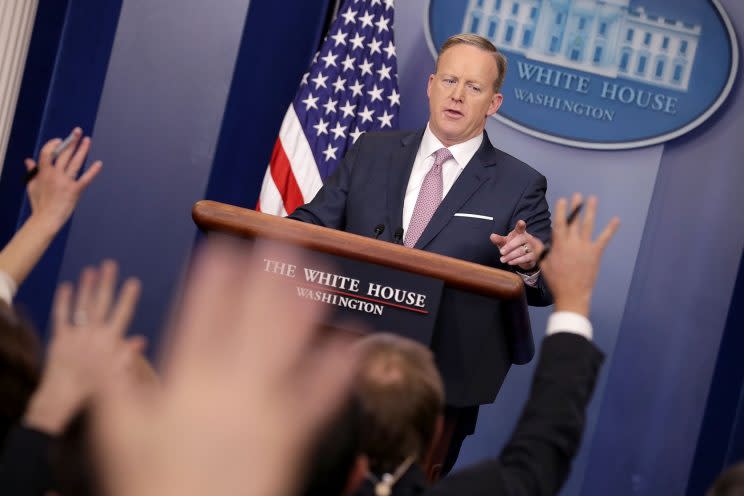Trump spokesman says negative coverage is ‘demoralizing’ to Trump
White House press secretary Sean Spicer, holding his first formal briefing with reporters, promised Monday not to lie to the press but complained about “demoralizing” news coverage. Spicer also said President Trump would soon unveil a Supreme Court nominee and a new plan for battling ISIS, but hedged on a controversial pledge to move the U.S. Embassy in Israel to Jerusalem.
Two days after reading an angry statement attacking the media coverage of Trump’s inauguration, Spicer spent 78 minutes in a packed White House briefing room taking roughly 60 questions about the new president’s plans and priorities and a few queries about his own role as the government’s top spokesman.
“Our intention is never to lie to you,” Spicer said when asked whether he would promise not to deliberately mislead the media. But he complained that “the default [media] narrative is always negative, and it’s demoralizing.”
Spicer continued, “When you’re constantly getting told that can’t be true, we doubt that you can do this, this won’t happen, and that’s the narrative when you turn on television every single day, it’s a little frustrating. … I’ve never seen it like this.”

That was the most detailed description of the mood among White House insiders since the inauguration, and how they and the president they work for process news coverage that they consider unfair. Top Trump aide Kellyanne Conway drew extensive online mockery this weekend after suggesting the White House had “alternative facts” to counter news reports on the size of the crowds at Trump’s inauguration. Spicer himself, at a press briefing on Saturday, provided inaccurate numbers for Metro ridership on Inauguration Day.
“There are times when you guys tweet something out or write a story, and you publish a correction. That doesn’t mean that you were trying to deceive readers and the American people, does it?” the press secretary asked. “And I think we should be afforded the same opportunity.”
By turns cautious and combative, Spicer provided news on several fronts: Trump will nominate a Supreme Court justice in “a couple of weeks,” the president is open to partnering with Moscow to battle the so-called Islamic State in Syria and he has plans to speak to Russian President Vladimir Putin. The spokesman also suggested that Trump would make headway on a new strategy for combating the Islamic State during a Friday visit to the Pentagon.
But Spicer seemed to hedge on whether Trump will proceed with his campaign promise to move the U.S. Embassy in Israel from Tel Aviv to Jerusalem, a pledge that previous commanders in chief have made on the stump, only to abandon once in office.
“We’re at the very early stages of that decision-making process,” said Spicer, who refused to predict whether the embassy would be in Jerusalem by 2020. Asked by Yahoo News if the process concerned just when and how to move it, or the fundamental question of whether to proceed, he replied, “If it was already a decision, then we wouldn’t be going through a process.”
Congress passed legislation 20 years ago to move the embassy to Jerusalem. But every president since has used his waiver power under the law to hold off, worried that the change would inflame the Arab world. The United States and most other countries have their embassies in Tel Aviv, and official U.S. policy has been that the status of Jerusalem must be decided in negotiations between Israel and the Palestinians.
Spicer also declined to rule out sending U.S. troops into Iraq to seize that country’s oil. Trump suggested the idea in a speech at CIA headquarters on Saturday, saying: “We should have kept the oil. But OK. Maybe you’ll have another chance. But the fact is, should have kept the oil.”
Asked about those remarks, Spicer replied, “If we’re going into a country for a cause, I think that he wants to make sure that America’s getting something out of it for the commitment and the sacrifice that we’re making.”
In a separate give-and-take about those comments, the spokesman declined to rule out using military force to take Iraq’s oil.
“I’m not going to talk about what we may or may not do. I think the president’s been very clear that he doesn’t telegraph … taking options off the table,” he said. “That’s not a good negotiation skill. That’s not how he works. There’s a reason he’s been successful at negotiating, is because he does it in a way that doesn’t telegraph to people what he’s going to take on or off the table.”
Read more from Yahoo News:



